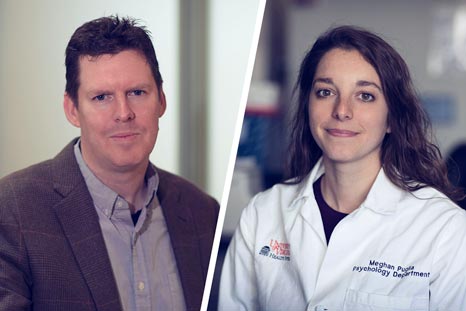Diseases and disorders of the brain and nervous system – such as Alzheimer’s disease, epilepsy and various forms of cognitive impairment – are complex to study, treat and cure, requiring multipronged approaches involving researchers and clinicians from a range of disciplines.
The University of Virginia Brain Institute, established two years ago, is dedicated to just that purpose: advancing brain research and education across fields of study, from the basic sciences to engineering, and through innovative clinical practice and trials, while also serving as a treatment center for brain diseases and disorders.
Last year, the offices of the Provost and of the Vice President for Research provided seed funding to establish a cross-disciplinary neuroscience fellowship program that will allow graduate students to conduct brain research through collaborations across the University. The University has funded seven graduate projects that span, in effect, the human lifespan – ranging from understanding the brain development of infants to the processes that lead to Alzheimer’s disease.
The program has been so successful that the Office of the President has contributed additional funding, and has named the winning graduate students “Presidential Fellows in Neuroscience.” The fellowships are unique, in that each research team works under two mentors – each from a different brain science discipline – affording the young researchers broad and specific perspectives and training experiences.
The Brain Institute has begun requesting proposals for four to five new fellowship projects in 2018.
“We are in a position to perform transformative work that will distinguish and differentiate our research enterprise in one of our true strengths – brain research,” said Christopher Deppmann, who oversees the fellowship program as director of UVA’s neuroscience graduate program. “Our goal is to challenge current research and clinical paradigms by enabling our students to conduct innovative cross-disciplinary research that they could not accomplish without the encouragement and support of the full university. I am heartened by the energy, spirit and hyper-collegial atmosphere we have among our faculty, students and administration.”
Deppmann’s own research, focused on understanding how neurons pass information to each other, is complex and by necessity cross-disciplinary, so he understands the value of working with and learning from colleagues in several fields. He holds a professorship with appointments in the College of Arts & Sciences and the schools of Medicine and of Engineering and Applied Science, and is dedicated to promoting collaborative research projects for his students.
One is Presidential Fellow in Neuroscience Sushanth Kumar, a Ph.D. student who is jointly mentored by Deppmann and neuroscience professor John Lukens. Kumar is developing better ways to understand the inflammatory pathways that facilitate the progress of Alzheimer’s.

“Challenging problems, such as Alzheimer’s disease, require that we bring together individuals with unique perspectives,” Kumar said. “Collaborative initiatives like the presidential fellowship are therefore essential to scientific progress, and poise us for a fresh take on one of our biggest health concerns.”
Another is Meghan Puglia, a Ph.D. student in psychology and a Presidential Fellow in Neuroscience. She is studying how individual differences in genes and the brain interact over the first year of life to shape social behaviors. Puglia works with faculty in the cognitive, developmental and neuroscience areas of the Psychology Department, and with the Department of Biomedical Engineering.
“To innovate and remain on the cutting edge of brain science requires the integration of diverse scientific perspectives,” Puglia said. “Participation in the fellowship program has allowed my research to span multiple levels of analysis – from genes, to brain, to behavior. I am grateful for this invaluable opportunity to train and conduct research with a multi-disciplinary team.”
Other multi-disciplinary projects in the fellowship program include: understanding epilepsy using automated 3-D brain reconstruction; identifying anatomical patterns of cognitive impairment via Magnetic Resonance Imaging; teasing out the interplay of dopamine and circadian rhythms on eating; and understanding how epigenetics underlie social experience.
“It is important that we offer interdisciplinary research opportunities to our doctoral trainees, many of whom will become the research leaders of tomorrow,” said Phil Trella, UVA’s assistant vice president for graduate and postdoctoral affairs. “They will be faced with the challenge not only of mastering their own disciplines, but also with communicating and operating as part of multidisciplinary teams in the workforce. The Presidential Fellows program provides the training opportunities that benefit the students and our university as we become ever more collaborative.”
Media Contact
Article Information
January 8, 2018
/content/brain-development-alzheimers-grad-fellows-take-wide-view

